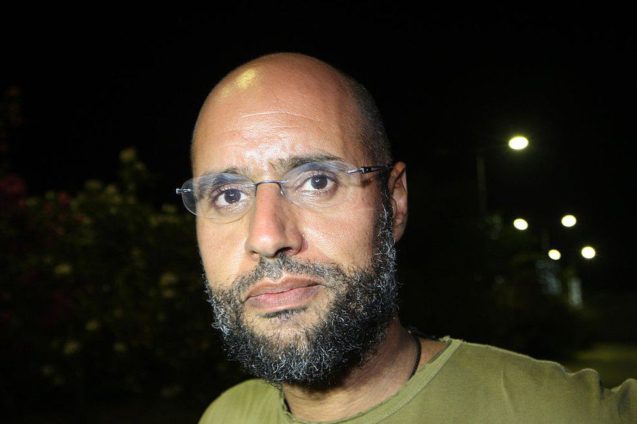The son of Libya's late leader Muammar al-Gaddafi has registered as a candidate in the country's first direct presidential election next month.
Saif al-Islam Gaddafi was once the heir apparent to his father, but his support for a brutal crackdown on protesters 10 years ago tarnished his image.
Since that 2011 uprising, Libya has been riven by conflict.
Rights groups have raised fears the vote, scheduled for 24 December, will not be free and fair.
World powers and the UN secretary-general have warned that anyone who tries to obstruct it or falsify the outcome will face sanctions.
Photos and video circulating online show Saif al-Islam Gaddafi sitting in front of a poster for the upcoming poll, signing electoral papers.
#BREAKING#VIDEO
— Libya Review (@LibyaReview) November 14, 2021
Saif Al-Islam Gaddafi arrives in Sebha to register himself as a presidential candidate.https://t.co/PzK4AXb3CT#Libya pic.twitter.com/YUask5LHmV
Bearded and wearing traditional Libyan clothing, he addressed the camera and cited a verse from the Koran that translates as, "judge between us and our people in truth".
"God always prevails in his purpose," he also said, citing another chapter of the Muslim holy book, and adding from another section - "even if the unbelievers hate it".
It is a very different image from the one he presented before the uprising that brought down his father in 2011.
In the aftermath of Muammar Gaddafi's brutal end, Saif al-Islam Gaddafi was himself captured by a militia.
He was held for six years, receiving a death sentence that was later overturned.
Mr Gaddafi is still wanted on war crimes charges by the International Criminal Court but has gradually re-emerged onto the public stage, including via an interview to the New York Times from his villa in Zintan earlier this year [paywall].
'Divisive but not a surprise'
Mr Gaddafi's comeback has sharply divided opinion in Libya, says BBC Monitoring's Amira Fathalla. Yet there is little surprise at his leadership bid, as he has been repeatedly touted as a contender for years.
Memories in Libya are likely still too raw for him to win the presidency, says the BBC's Middle East editor Sebastian Usher, and his candidacy will further complicate the already fragile electoral process.
After years of civil war and rival powers operating in the east and west of the country, Libya is currently led by an interim government but remains politically unstable.
Disagreement between Libya's political bodies and opposing factions about the election rules and the schedule have threatened to derail the presidential vote.
Other candidates in the running are the warlord Khalifa Haftar - who previously led an insurgency from his eastern base against the UN-backed government in Tripoli, plus Prime Minister Abdulhamid al-Dbeibah and parliament speaker Aguila Saleh.
Latest Stories
-
Beating Messi’s Inter Miami to MLS Cup is feels amazing – Joseph Paintsil
3 minutes -
NDC administration will reverse all ‘last-minute’ gov’t employee promotions – Asiedu Nketiah
14 minutes -
Kudus sights ‘authority and kingship’ for elephant stool celebration
15 minutes -
We’ll embrace cutting-edge technologies to address emerging healthcare needs – Prof. Antwi-Kusi
48 minutes -
Nana Aba Anamoah, Cwesi Oteng to attend Philip Nai and Friends’ charity event
53 minutes -
Environmental protection officers receive training on how to tackle climate change
56 minutes -
CLOGSAG vows to resist partisan appointments in Civil, Local Government Service
2 hours -
Peasant Farmers Association welcomes Mahama’s move to rename Agric Ministry
2 hours -
NDC grateful to chiefs, people of Bono Region -Asiedu Nketia
2 hours -
Ban on smoking in public: FDA engages food service establishments on compliance
2 hours -
Mahama’s administration to consider opening Ghana’s Mission in Budapest
2 hours -
GEPA commits to building robust systems that empower MSMEs
2 hours -
Twifo Atti-Morkwa poultry farmers in distress due to high cost of feed
2 hours -
Central Region PURC assures residents of constant water, power supply during yuletide
2 hours -
Election victory not licence to misbehave – Police to youth
2 hours

